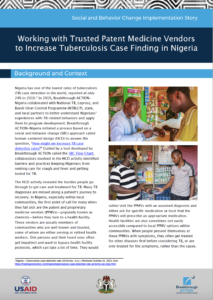In 2021, Nigeria accounted for 4.4% of the world’s tuberculosis (TB) cases, ranking sixth among nations with the highest case rate.[1] About 500,000 Nigerians are infected with TB annually.[2],[3] Moreover, Nigeria struggles to identify TB cases; in 2018, the country’s National TB, Leprosy, and Buruli Ulcer Control Programme (NTBLCP) only was able to track 24% of cases.[4]
Decisions on if, when, and where to seek testing and treatment for TB are influenced by a multitude of social and behavioral factors, such as knowledge of TB, how likely a person is to think they are to contract the disease (perceived susceptibility), how serious they think it would be if they were diagnosed with TB (perceived severity), their perception of the available health services, their confidence in their ability to seek those services, and TB-related stigma and discrimination, among others. To deepen its understanding of why TB cases were hard to find and what influenced a person’s TB care-seeking behavior, Breakthrough ACTION worked with the NTBLCP in 2019 to learn about community members’ experiences with TB-related behaviors using a human-centered design approach.
This process uncovered deep insights about what Nigerians with TB experience in their journey to get tested and treated. Four key insights emerged from this process:
- Individuals take a long journey, literally and figuratively, before they attain proper treatment for TB.
- While testing is free, sick individuals incur indirect costs.
- Stigma is a barrier to case-finding and care-seeking.
- Myths and misconceptions about TB are prevalent.
Breakthrough ACTION-Nigeria, NTBLCP, and partners, and community members used these insights as springboards to generate ideas for solutions.
Four stories detail how Breakthrough ACTION-Nigeria placed community members’ needs at the center of its work and collaborated to design and implement solutions using SBC approaches—and since their activities began, case detection has steadily increased. These implementation stories also include lessons learned in the process and recommendations:
- Working with Trusted Patent Medicine Vendors to Increase Tuberculosis Case Finding in Nigeria
- Working with Religious Leaders to Address Tuberculosis in Nigeria through Social and Behavior Change
- Working with the Media to Address Tuberculosis in Nigeria through Social and Behavior Change
- Working Through Motorized Campaigns to Overcome Pandemic-Related Barriers to Tuberculosis Service Delivery
[1] WHO. (2022). Global tuberculosis report 2022. 2.1 TB Incidence. https://www.who.int/teams/global-tuberculosis-programme/tb-reports/global-tuberculosis-report-2022/tb-disease-burden/2-1-tb-incidence
[2] WHO calculates 219 cases per 100,000 people; applied across Nigeria’s population, that extrapolates to 500,00 (see also footnote 3). Source: WHO. (2022). Global tuberculosis report 2022. See footnote 1.
[3] Todo, T. A. (2023, March 24). Nigeria records 500,000 TB cases yearly, says expert. The Guardian. https://guardian.ng/news/nigeria-records-500000-tb-cases-yearly-says-expert
[4] Nigeria—Tuberculosis case detection rate (All forms). (n.d.). Retrieved October 25, 2023, from https://tradingeconomics.com/nigeria/tuberculosis-case-detection-rate-all-forms-wb-data.html
LEARN MORE
Working with Trusted Patent Medicine Vendors to Increase TB Case Finding in Nigeria [PDF]
Working with Religious Leaders to Address TB in Nigeria through SBC [PDF]
Working with the Media to Address TB in Nigeria through SBC [PDF]
Working Through Motorized Campaigns to Overcome Pandemic-Related Barriers to TB Service Delivery [PDF]


